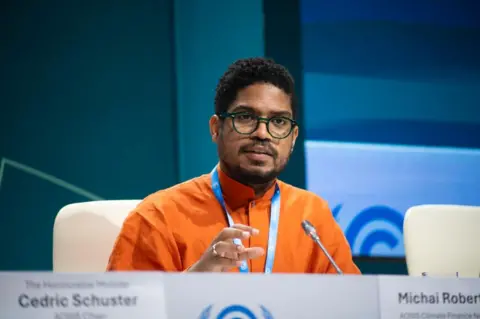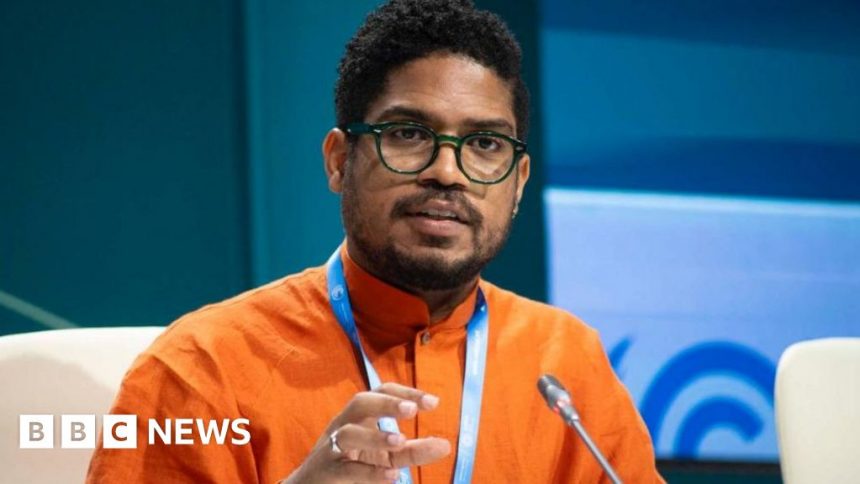‘We were ready to leave climate summit’ – negotiator tells BBC
A key negotiator for the group of small island nations who walked out of the UN climate talks on Saturday, pushing them close to collapse, has told BBC News that the group was ready to leave the summit altogether.
Michai Robertson, finance negotiator for the Alliance of Small Island States (AOSIS) said that other countries were “laughing at them” for asking for larger sums of money to help them tackle climate change.
He said the discussions reached “boiling point” but that their walk-out shows the power of his group.
“We’re not going to be walked over, as we have been many times in the past,” he said.
 AOSIS
AOSISThe walkout happened when talks were over-running by 19 hours and was a moment of high drama in the fraught COP29 talks in Baku, Azerbaijan, shocking observers.
AOSIS was accompanied by another block called the Least Developing Countries.
Mr Robertson said future talks, including at COP30 in Brazil next year, must “put aside petty geopolitics”.
He said “all signs indicate” that the election of US President Donald Trump before the talks meant the final deal at COP29 was weaker.
Journalists are not allowed inside the negotiating rooms, and this is the first time the Alliance of Small Island States (AOSIS) has talked about why they left.
It marked the only time in the 29-year history of UN climate talks that AOSIS has walked out.
AOSIS represents 43 countries and territories, like Samoa, Barbados and Trinidad, that are particularly vulnerable to climate change and have few resources to cope with the impacts.
At UN climate summits, their priorities are more money to help them deal with problems like eroding coastlines and devastating weather events.
But they also want much stronger action on tackling the causes of climate change, namely burning fossil fuels.
Their motto is “1.5 to stay alive” referring to the agreed goal of keeping global temperature rise at 1.5C above pre-industrial levels.
Current UN projections say that, without action, the world is heading for at least 3.1C of warming. AOSIS says that is a death sentence for the islands’ peoples.
At the time of the walkout, ministers had been discussing in “Meeting Room 3” in the COP venue to thrash out details of a deal on more cash, even as the talks ran more than 18 hours over time.
Mr Robertson said the walk-out was “spontaneous”, not planned. “It was so quick and instinctive,” he said.
“Evans Njewa [the chair of the Least Developed Group] raised his country flag. He took the floor and explained how frustrated he was,” Mr Robertson said.
“‘You’re not hearing us’, he said. Then he stood up. Everyone stood up with him and then we just left,” he added.
Journalists on the outside of the meeting room saw the door open, and the group of negotiators walked out.
Mr Robertson said the two groups went next door into “Meeting Room 11”.
“As soon as we did that everyone was calling us – the COP presidency, developed counties, the chair of G77 [another powerful bloc of developing countries],” he said.
“It’s really sad that it took us walking out to get that,” he said.
Mr Robertson says AOSIS have always been “pragmatic” in these talks, because they have so much to lose from worsening climate change and relatively little power compared to big nations like the US and China.
He said the COP process is important to them because it is the only forum globally where their voice matters, but “we’re also kind of held hostage by the process”.
In the end, AOSIS came back to the negotiating table and a deal was passed in the early hours of Sunday morning.
It agreed that developed nations would provide $300bn a year until 2035 to developing counties – but that sum was far short of the $500bn in public finances called for.
The deal also agreed in principle that $1.3tn in total is needed from public and private sources for developing nations but it did not agree where this money would come from and who would pay it.
Mr Robertson said it was “acquiescence” that meant AOSIS returned to the talks.
“The $300bn goal is not sufficient,” he said, but he said that they will try to increase the ambition for more finance in years to come.
“The best thing that came out of this is that they know we are a force to be reckoned with,” he said.






